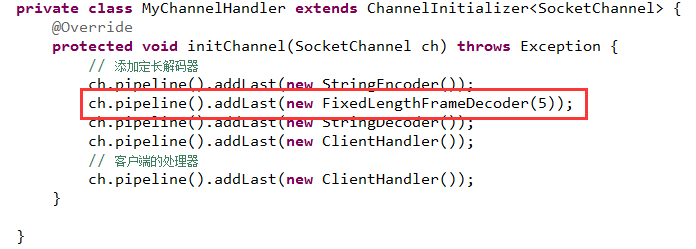Netty之解决TCP粘包拆包(设置定长消息)
1、什么是粘包/拆包
一般所谓的TCP粘包是在一次接收数据不能完全地体现一个完整的消息数据。TCP通讯为何存在粘包呢?主要原因是TCP是以流的方式来处理数据,再加上网络上MTU的往往小于在应用处理的消息数据,所以就会引发一次接收的数据无法满足消息的需要,导致粘包的存在。处理粘包的唯一方法就是制定应用层的数据通讯协议,通过协议来规范现有接收的数据是否满足消息数据的需要。
2、解决办法
2.1、消息定长,报文大小固定长度,不够空格补全,发送和接收方遵循相同的约定,这样即使粘包了通过接收方编程实现获取定长报文也能区分。
2.2、包尾添加特殊分隔符,例如每条报文结束都添加回车换行符(例如FTP协议)或者指定特殊字符作为报文分隔符,接收方通过特殊分隔符切分报文区分。
2.3、将消息分为消息头和消息体,消息头中包含表示信息的总长度(或者消息体长度)的字段
3、Netty中提供了FixedLengthFrameDecoder定长解码器可以帮助我们轻松实现第一种解决方案,定长解码报文。如果原始数据的长度不够定长,需要增加空格来达到定长。
4、加入FixedLengthFrameDecoder定长解码器
4.1 在服务端,加入FixedLengthFrameDecoder定长解码器
4.2 在客户端,加入FixedLengthFrameDecoder定长解码器
5、服务端代码实现
import io.netty.bootstrap.ServerBootstrap;
import io.netty.channel.ChannelFuture;
import io.netty.channel.ChannelInitializer;
import io.netty.channel.ChannelOption;
import io.netty.channel.EventLoopGroup;
import io.netty.channel.nio.NioEventLoopGroup;
import io.netty.channel.socket.SocketChannel;
import io.netty.channel.socket.nio.NioServerSocketChannel;
import io.netty.handler.codec.FixedLengthFrameDecoder;
import io.netty.handler.codec.string.StringDecoder;
import io.netty.handler.codec.string.StringEncoder;
public class Server {
public void bind(int port) throws Exception {
// 服务器线程组 用于网络事件的处理 一个用于服务器接收客户端的连接
// 另一个线程组用于处理SocketChannel的网络读写
EventLoopGroup bossGroup = new NioEventLoopGroup();
EventLoopGroup workerGroup = new NioEventLoopGroup();
try {
// NIO服务器端的辅助启动类 降低服务器开发难度
ServerBootstrap serverBootstrap = new ServerBootstrap();
serverBootstrap.group(bossGroup, workerGroup)
.channel(NioServerSocketChannel.class)// 类似NIO中serverSocketChannel
.option(ChannelOption.SO_BACKLOG, 1024)// 配置TCP参数
.option(ChannelOption.SO_BACKLOG, 1024) // 设置tcp缓冲区
.option(ChannelOption.SO_SNDBUF, 32 * 1024) // 设置发送缓冲大小
.option(ChannelOption.SO_RCVBUF, 32 * 1024) // 这是接收缓冲大小
.option(ChannelOption.SO_KEEPALIVE, true) // 保持连接
.childHandler(new ChildChannelHandler());// 最后绑定I/O事件的处理类
// 处理网络IO事件
// 服务器启动后 绑定监听端口 同步等待成功 主要用于异步操作的通知回调 回调处理用的ChildChannelHandler
ChannelFuture f = serverBootstrap.bind(port).sync();
System.out.println("Server启动");
// 等待服务端监听端口关闭
f.channel().closeFuture().sync();
} finally {
// 优雅退出 释放线程池资源
bossGroup.shutdownGracefully();
workerGroup.shutdownGracefully();
System.out.println("服务器优雅的释放了线程资源...");
}
}
/**
* 网络事件处理器
*/
private class ChildChannelHandler extends ChannelInitializer {
@Override
protected void initChannel(SocketChannel ch) throws Exception {
ch.pipeline().addLast(new StringEncoder());
// 设置定长字符串接收
ch.pipeline().addLast(new FixedLengthFrameDecoder(5));
// 设置字符串形式的解码
ch.pipeline().addLast(new StringDecoder());
ch.pipeline().addLast(new ServerHandler());
}
}
public static void main(String[] args) throws Exception {
int port = 9998;
new Server().bind(port);
}
}
import io.netty.channel.ChannelHandlerAdapter;
import io.netty.channel.ChannelHandlerContext;
public class ServerHandler extends ChannelHandlerAdapter {
@Override
public void channelRead(ChannelHandlerContext ctx, Object msg)
throws Exception {
String request = (String) msg;
System.out.println("Server :" + msg);
String response = request;
ctx.writeAndFlush(response);
}
@Override
public void exceptionCaught(ChannelHandlerContext ctx, Throwable t)
throws Exception {
ctx.close();
}
}
import io.netty.bootstrap.Bootstrap;
import io.netty.channel.ChannelFuture;
import io.netty.channel.ChannelInitializer;
import io.netty.channel.ChannelOption;
import io.netty.channel.EventLoopGroup;
import io.netty.channel.nio.NioEventLoopGroup;
import io.netty.channel.socket.SocketChannel;
import io.netty.channel.socket.nio.NioSocketChannel;
import io.netty.handler.codec.FixedLengthFrameDecoder;
import io.netty.handler.codec.string.StringDecoder;
import io.netty.handler.codec.string.StringEncoder;
public class Client {
/**
* 连接服务器
*
* @param port
* @param host
* @throws Exception
*/
public void connect(int port, String host) throws Exception {
// 配置客户端NIO线程组
EventLoopGroup group = new NioEventLoopGroup();
try {
// 客户端辅助启动类 对客户端配置
Bootstrap b = new Bootstrap();
b.group(group)//
.channel(NioSocketChannel.class)//
.option(ChannelOption.TCP_NODELAY, true)//
.handler(new MyChannelHandler());//
// 异步链接服务器 同步等待链接成功
ChannelFuture f = b.connect(host, port).sync();
// 等待链接关闭
f.channel().closeFuture().sync();
} finally {
group.shutdownGracefully();
System.out.println("客户端优雅的释放了线程资源...");
}
}
/**
* 网络事件处理器
*/
private class MyChannelHandler extends ChannelInitializer {
@Override
protected void initChannel(SocketChannel ch) throws Exception {
// 添加定长解码器
ch.pipeline().addLast(new StringEncoder());
ch.pipeline().addLast(new FixedLengthFrameDecoder(5));
ch.pipeline().addLast(new StringDecoder());
ch.pipeline().addLast(new ClientHandler());
// 客户端的处理器
ch.pipeline().addLast(new ClientHandler());
}
}
public static void main(String[] args) throws Exception {
new Client().connect(9998, "127.0.0.1");
}
}
import io.netty.channel.ChannelHandlerAdapter;
import io.netty.channel.ChannelHandlerContext;
public class ClientHandler extends ChannelHandlerAdapter {
@Override
public void channelActive(ChannelHandlerContext ctx) throws Exception {
// 客户端连接成功,给服务端发送数据
ctx.channel().writeAndFlush("aaaaabbbbb");
// 增加空格,达到定长
ctx.channel().writeAndFlush("ccccccc ");
}
@Override
public void channelRead(ChannelHandlerContext ctx, Object msg)
throws Exception {
String response = (String) msg;
System.out.println("Client: " + response);
}
@Override
public void exceptionCaught(ChannelHandlerContext ctx, Throwable cause)
throws Exception {
ctx.close();
}
}

